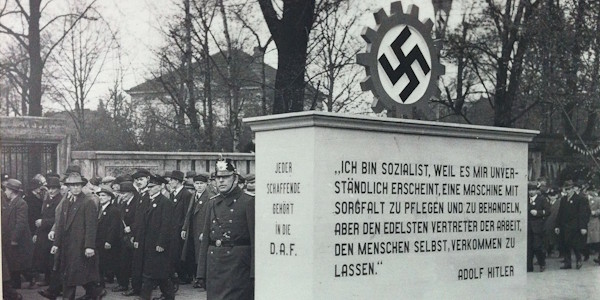Everything you never wanted to know about Marx.
Marxism is en vogue, even though Marxism has resulted in failure and poverty. It seems that the sympathy with which Marxism is viewed results from deep, irrational emotions ... emotions which hark back to our history as a social, tribal animal.

I make this point to counter a bizarre assumption often made about socialism/communism: that this ideology originated in the 1800's. If the human inclination towards socialism runs so deep that it supersedes its abysmal historical record, then it must be part of our human nature.
Monasteries come to mind, where people chose to live in communes: sharing food and clothing, eschewing private property. A more perfect communist society was ne'er seen. Strangely, though, monasteries are not celebrated by communist sympathizers.
This paradox can be explained by how communism was defined by Marx: as a commune encompassing the entire society, brought about by revolution. To Marx, the monasteries would have been an unwelcome reminder that no revolution was needed, and also that never more than 1% of the population voluntarily embraced communism.
So, monasteries might have been a significant obstacle to the spread of communism, were it not for Marx' trouvaille: Marx never called for a violent revolution, or murdering opponents while abolishing freedom. Marx simply pointed to its inevitability. Marx claimed scientific certitude about the course of history. Marx posited himself as merely the messenger.
With the benefit of hindsight we now know that Marx' claim was nonsense. Communism was not inevitable. If anything was inevitable, it was the fall of communism.
If Marx skillfully circumvented the lack of popular support, the communists now ran into a subsequent problem. You see, astronomers do not have to advocate, pray or chant for the return of Halley's comet. They predict its return every 76 years, and then go about their daily business. After all, astronomers have scientific certitude.
Marx and friends adopted a similar attitude: for the second half of the 1800's they sat around in their salons, waiting for the inevitable revolution to arrive. Slowly, very slowly, it dawned on them that something was amiss. Of course, it was unthinkable that communism was amiss. So as frustrations boiled over, they proposed three solutions.
The first was social-democracy: participating in elections with a socialist agenda. This met with considerable success, but never enough to usher in the revolution. In England, this resulted in the Labour party. In Germany, the SDAP was founded in 1869.
The second was anarchism, as proposed by Errico Malatesta. He advocated propaganda of the deed, holding that revolutionary ideas could best be spread by terrorism. An anarchist ploy may be to fire at the police over the heads of peaceful protesters, hoping to elicit an violent response. Victims of such a response can then be held up as martyrs and used to radicalize and polarize.
The third was national-socialism or fascism, as advocated by lifelong socialist Mussolini. From the age of sixteen, Benito worked for the Partito Socialista Italiano as an organizer, journalist and agent-provocateur. The First War saw Mussolini in the trenches, getting wounded, emerging as a war-hero. But Mussolini had gained a key insight: there was no such thing as international solidarity. German, French, English and Italian workers were chomping at the bit to kill each other. From this, Mussolini concluded that the international pretensions of socialism were an obstacle to success. Socialism was to succeed on a national scale.
If 1850 through 1914 had proved to be a long dry spell, the First War proved a turning point for the fortunes of the socialists. In 1917, an anarchist coup d'état succeeded in Russia. In 1922, a fascists coup d'état succeeded in Italy. In 1933, the NSDAP acceded to power in Germany. At long last: power!
Of course, none of these power-grabs came close to the workers' revolution as predicted by Marx. Popular support was enjoyed only by Hitler and Mussolini. Both held together an alliance of socialists and racially-motivated nationalists. A workers' paradise never materialized.
But not for a lack of trying. The NSDAP created the modern welfare-state: first in Germany, subsequently in occupied countries. Their 25 Punkte Programm called for
- the state to provide livelihood and health-care for its citizens,
- every citizen was obligated to work,
- confiscation of all war profits,
- abolishment of interest and speculation,
- nationalization of industry,
- old age welfare,
- et cetera.

And indeed many socialists ideas were realized by Hitler, among which
- the doubling of workers' vacation,
- agricultural subsidies and price-control,
- the progressive income-tax,
- the introduction of environmental protection,
- rent-control,
- child benefits,
- free health-care,
- tax on alcohol and tobacco,
- a Universal Basic Income for house-rent, insurance, coal (for heating) and potatoes
Of course, the Germans lost the war and left. But the socialism stayed. Western European countries now elected social-democrats, who maintained the welfare state established by the Nazi's. Take, for example, the Dutch law which prohibits the termination of employment, established in 1942. This law is still on the books. In 2006 the Dutch social-democrats blocked a much-needed modernization; and the labor-unions declared this law to be "holy".
Thus, communism succeeded implicitly rather than explicitly. Many of our citizens are unaware how many of their ideas derive from the Marx and Hitler. They simply do not know any better.
by Renkema